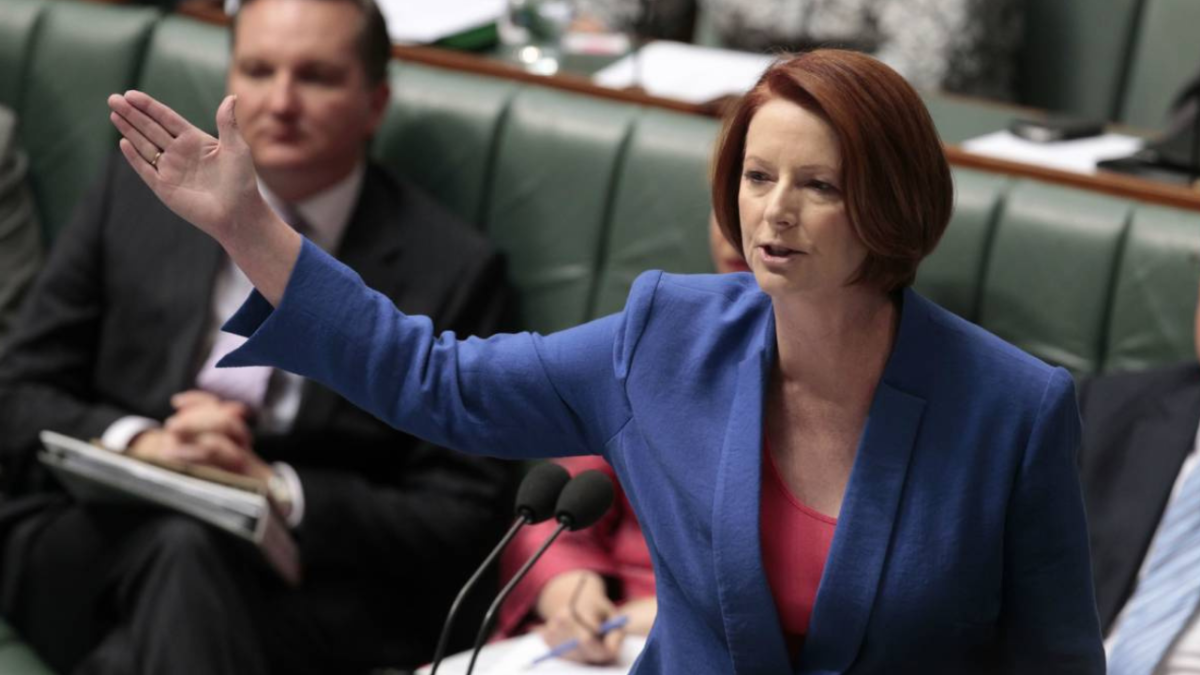
A new global survey has found young Australian women and gender-diverse people feel more jaded, silenced and let down by the country’s politicians and political systems than the global average and hmm, funny that.
Plan International surveyed 29,000 girls, women and gender-diverse people aged 15-24 from 29 countries and 60 per cent of Australian respondents “disagreed” with the statement that politicians act in their best interests, compared to the global figure of 43 per cent.
53 per cent also said their political leaders’ decisions actually made them feel more stressed, worried or anxious — 10 per cent higher than the global average.
So why are young women in 2022 disenfranchised?
Well, October 9 is the 10th anniversary Julia Gillard‘s famous misogyny speech and it seems the bigotry she experienced during her term as Australia’s first female Prime Minister may have played a part in turning a generation of women off politics and politicians.
Plan Internation Australia youth advocate Grace Falconer told PEDESTRIAN.TV one of her earliest experiences with politics was witnessing hatred hurled at Gillard.
“It definitely impacted what I thought of politics,” the 22-year-old said.
“I was 11 at the time but it was horrible that she was being called a witch and especially by the opposition leader. It definitely influenced me and clearly a lot of other Australian women.
“Everything that’s happened to Brittany Higgins and Grace Tame since, who have been so brave to speak up … it’s probably why so many women feel politics is not a place for them.”
Associate Lecturer at ANU’s School of Politics and International Relations Intifar Chowdhury told PEDESTRIAN.TV there were two main reasons young women are disenfranchised: a lack of representation in parliament and the terrible treatment of female politicians.
“The people pulling the strings of the country don’t reflect the people they represent. When you look at the parliament you don’t see yourself if you’re a young woman. It’s still a boys club,” she said.
This isn’t unique to Australia of course, many parliaments around the world are made up of mostly men. But the treatment of our female politicians and the revolving allegations of sexual harassment, assault and bullying have shown how uniquely toxic Australian politics is.
“Gillard’s famous speech summed up the atrocities that a woman has to face within the walls of parliament, from what you wear to whether you are married or not,” Chowdhury said.
The Plan International survey showed 72 per cent of young Australian women did not feel politics was an equal or inclusive space and just 10 per cent believed Parliament was a safe workplace for women.
“It has been a tumultuous couple of years for women in Australian politics,” CEO of Plan International Australia Susanne Legena said.
“Even so, these results are disappointing. Australian girls feel irrelevant and disenfranchised when they should be being encouraged to take part in political discourse and the political process.”
42% of young Aussie women and gender-diverse people said diversity in politics would make them more likely to consider a political career and thankfully, we are slowly getting better. Australia’s 47th parliament is the most diverse in history, with more women than ever before.
“What we see [in the media] we just associate a politician with a white, privileged man, so how would that represent my views and why would I get involved in politics?” Falconer said.
“We’re definitely moving in the right direction but we definitely need to keep that momentum going because creating a sustained culture that is really inclusive and diverse will take time.”
The study also revealed 97 per cent of young women thought politics was important. Chowdhury said although young people may feel disheartened, they’re certainly not less engaged.
“It’s very easy to turn that disenfranchisement into ‘oh young people are disengaged’ but that is not true in Australia,” she said.
Young people in Australia go quite against the international current and are actually more engaged in political issues, she said, likely in part because of our compulsory voting laws.
But the way people engage is changing.
“People are trying to be active in non-elite channels. You might see a decline in party memberships but young people are more active online or in demonstrations,” she said.
“People are increasingly turning away from party-directed ways of political engagement but at a grassroots level the discourse is directed by the issue, rather than the parties.”
Most young people in Australia will have formed an opinion on most topical issues, even on issues that don’t directly affect them. Chowdhury said this showed Gen Z Australians are not only extremely tuned in, but they are “compassionate, understanding and introspective”.
Amen.



